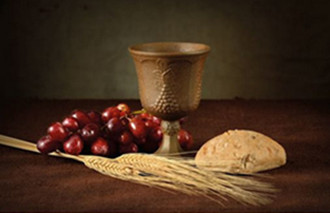
The Most Holy Body and Blood of Christ C
Readings: Genesis 14:18‑20 1 Corinthians 11:23‑26 Luke 9:11‑17
In the transition between the Easter season and ordinary time, the Church celebrates the Solemnity of the Most Holy Body and Blood of Christ. This Sunday's readings present us with richness of the Eucharist as thanksgiving, as re-enactment of Jesus' sacrificial death for us, as anticipation of his return, and finally as pattern for our life in following Jesus.
The Old Testament reading from Genesis recounts Melchizedek's blessing of Abram after his victory over four kings and the rescue of his nephew Lot (see Genesis 14). Melchizedek is the king of Salem, or Jerusalem, and his meeting with Abram is a joyful meal in thanksgiving for the victory which has rid Canaanite territory of a foreign menace. Early Christian writers understood this story as an anticipation of the Christian Eucharist and the priest‑king Melchizedek as a type for Christ (see Hebrews). In the course of sharing a meal of bread and wine, Melchizedek blesses both Abram and God Most High who brought him victory. "Blessed be Abram by God Most High,/ the creator of heaven and earth;/ And blessed be God Most High,/
who delivered your foes into your hand." Our Eucharist shares this character of thanksgiving and blessing for a God's victory over sin and death in Christ.
The reading from Paul's first letter to the Corinthians is the earliest record of Jesus' actions and words at his final meal with his disciples on the night before he died. "The Lord's supper" was celebrated both as a proclamation of Jesus' saving death and an anticipation of his return in glory. Paul recounts that the Lord Jesus said of the broken bread: "This is my body, which is for you. Do this in remembrance of me." The cup is his blood which seals the new covenant promised by Jeremiah: "This cup is the new covenant in my blood. Do this, whenever you drink it, in remembrance of me." Paul concludes by reminding the Corinthians that the Eucharist both proclaims Jesus' sacrificial death and anticipates his return in glory. "Every time, then, you eat this bread and drink this cup, you proclaim the death of the Lord until he comes!"
The Gospel is Luke's account of the multiplication of the loaves and fishes. It comes at a crucial turning point in Luke's story and draws a sharp contrast between the power of Jesus and his disciples. Jesus is completing his Galilean ministry and is about to embark on his journey to Jerusalem where he will suffer, die, rise, and ascend to the Father. His disciples have just returned from a successful journey on which through the power given them by Jesus they proclaimed the good news and cured diseases (Lk 9:1‑10). Now Jesus challenges the Twelve to feed the crowds who have followed them to a "deserted place." But they are powerless to satisfy the needs of the group that numbers five thousand men alone and are forced to say: “Five loaves and two fish are all we have, unless we ourselves go and buy food for all these people.” Only Jesus, like the Lord who fed his people with manna in the wilderness (Exodus 16), can satisfy the needs of the crowd. He does so in a superabundant way that points to his mission to reconstitute the twelve tribes of Israel. The account ends with the note: “They all ate and were satisfied. And when the left‑over fragments were picked up, they filled twelve wicker baskets. (Lk 9:17)
This meal both looks back to Jesus' actions in the Galilean ministry and forward to the events in Jerusalem. In the opening sentence we are told, "Jesus spoke to the crowds of the reign of God, and he healed all who were in need of healing." This is a summary of Jesus' work in the Galilean ministry (see Lk 4:14‑9:9). Jesus' actions in feeding the people also anticipate the Last Supper and the breaking of bread in the Emmaus story. In all three Jesus "blessed," "broke," and "gave" bread. Luke is the only evangelist to link this feeding miracle to the confession of Jesus as the Messiah, his first prediction of the passion and resurrection, and the need for the disciples to follow him on this path (see Lk 9:18‑27). To celebrate the Eucharist the disciples must share in Jesus’ mission to the poor and the sick (Lk 9:1‑6) and also must be willing to follow him to the cross. After announcing that he must go to Jerusalem to be rejected, killed, and be raised on the third day, Jesus says to the disciples, "If anyone wishes to come after me, he must deny himself and take up his cross daily and follow me." (9:23)
No comments:
Post a Comment